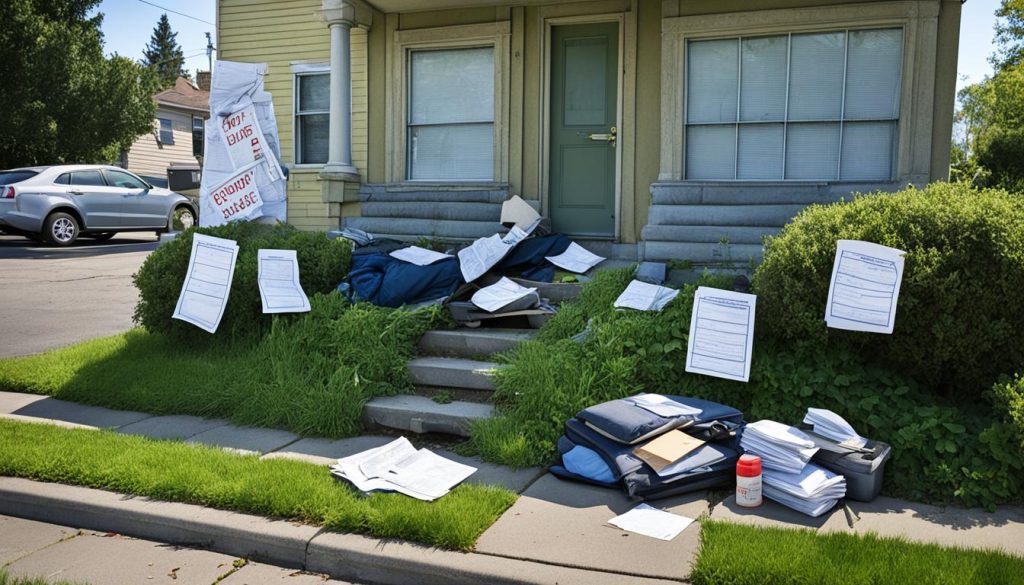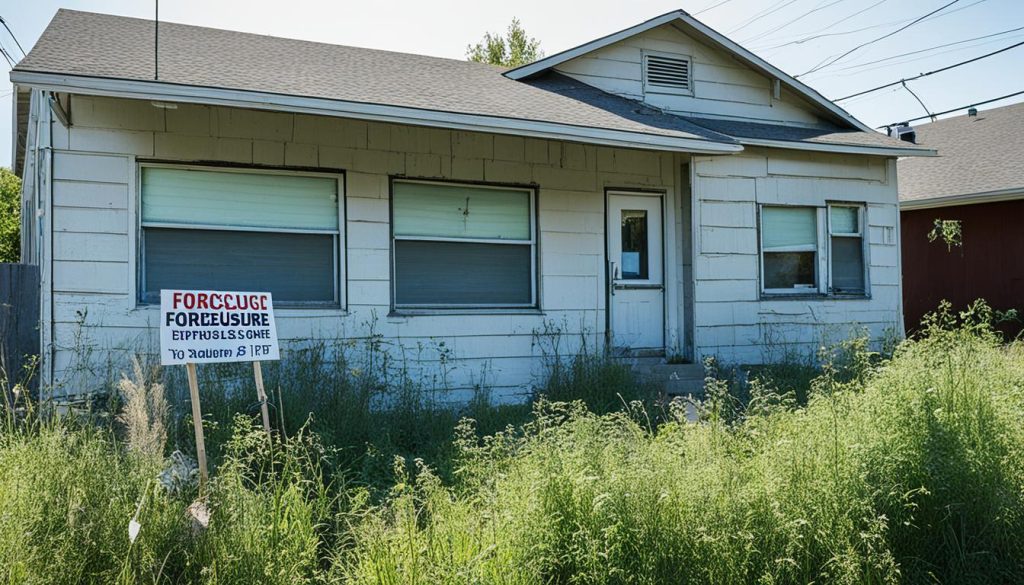Foreclosure is a big financial challenge that can affect you and your community a lot. If you don’t pay your mortgage, the lender can take your home through foreclosure. This loss can hurt your credit score, making it hard to get loans or find affordable housing1.
The foreclosure process has many steps and legal rules that differ by state. In Texas, most foreclosures are non-judicial, meaning the lender can take the property without court approval2. But, home equity loans in Texas need a judicial foreclosure, which means getting a judge’s okay first2.
Going through foreclosure is tough, both emotionally and financially for homeowners. Losing a home can deeply affect families with kids. It can also make neighborhoods worse, with empty houses drawing crime and lowering property values.
Key Takeaways
- Foreclosure is the legal process where a lender seizes a homeowner’s property due to missed mortgage payments.
- The foreclosure process in Texas typically involves non-judicial foreclosure, with some exceptions for home equity loans.
- Foreclosure can have severe financial and emotional consequences for homeowners, including damage to credit scores and the loss of their home.
- Foreclosures can also negatively impact communities, leading to increased crime and declining property values.
- Seeking assistance from a foreclosure defense attorney can provide homeowners with more options and help negotiate a resolution.
Understanding Mortgage Default
Understanding mortgage default can seem tough, but it’s key to grasp the basics. A mortgage is a deal between a lender and a homeowner. It lists the loan’s terms and conditions3. If a homeowner misses a payment, they’re in default on the contract. This happens for many reasons, like budget issues or financial troubles3.
What is Mortgage Default?
Mortgage default means not making monthly payments as agreed in the contract3. Lenders usually don’t call a loan in default until two payments are missed3. But missing payments can lead to extra fees and penalties. This makes it harder for the borrower to pay back what they owe.
Causes of Mortgage Default
Many things can lead to mortgage default. Job loss, less income, sudden medical bills, and other money problems can make it hard to pay the mortgage3. Also, stricter loan rules make it harder for some to get loans, raising the chance of default3.
Adjustable-rate mortgages can also cause default if the interest rates change, making payments go up3. No matter the reason, defaulting on a mortgage is bad for both the borrower and the lender. Homeowners should act fast to fix the problem.
“Mortgage default is a serious issue that can have far-reaching consequences, but with the right information and support, homeowners can find a path forward.”
Dealing with Mortgage Default
If you’re facing a mortgage default, it’s key to understand your situation and prepare for talks with your lender. Asking the right questions and getting the right info helps you handle this tough time better4.
Questions to Ask Yourself
Before talking to your lender, think about your current situation. Ask yourself these questions:
- What caused my default, and how long will this problem last?
- What is my expected income over the next 1 month, 6 months, and 12 months?
- Do I usually pay my mortgage on time, or is this an unusual occurrence?
- What are the terms of my loan, and how long do I have to pay it off?
- If I had to sell my home, could I do so, and what is its current value and condition?
Preparing for Lender Communication
When you’re ready to talk to your lender, have these documents and info ready:
- Opened mail from your lender
- Your account number
- Details about your hardship and current circumstances
- Pay stubs, award letters, tax returns, and bank statements
- Expense and budget information
- Any foreclosure-related documents you may have received
Understanding your default situation and preparing for lender talks can help you find a solution that suits you5.

“Acting quickly when facing foreclosure in Texas provides more options for homeowners.”4
Getting help from a foreclosure defense attorney is also smart. They can guide you through the legal process and may help you avoid foreclosure4.
Outcomes of Mortgage Default
Short-Term Resolutions
When you miss mortgage payments, your lender will try to help you6. They might call, send letters, or even visit your home to help you get back on track. But, if you miss two or more payments, things get harder6.
If you’re facing a short-term problem like losing your job or high medical bills, you might be able to get a repayment plan6. This plan lets you pay back missed payments little by little, adding a small amount to your regular payment6.
It’s important to talk to your lender quickly and look into these options before foreclosure starts6. Foreclosure is the worst-case scenario, but acting fast can prevent it and save your home.

“The foreclosure process varies by state, but borrowers generally have at least 60 days from their first missed payment to take action and avoid the start of foreclosure proceedings.”6
The foreclosure process, loan modification, short sale
When a homeowner can’t pay their mortgage, foreclosure looms. But, there are ways out like loan modification and short sale. These options can ease the financial strain. Let’s look at the foreclosure steps and these alternatives7.
Phases of Foreclosure Process
- Payment Default: Missing one mortgage payment puts a homeowner at risk.
- Notice of Default: After missing four payments, a 30-day notice is sent to fix the issue before foreclosure starts.
- Notice of Trustee’s Sale: The lender’s lawyer sets a sale date for the property.
- Trustee’s Sale: The property is auctioned off to the highest bidder.
- Real Estate Owned (REO): If the auction doesn’t sell it, the lender takes over and tries to sell it.
- Eviction: Homeowners must leave if the property is sold and they’re still inside.
Foreclosure is stressful, but there are ways to keep your home. Loan modification and short sale are two such options7.
Loan Modification
Loan modifications can save homeowners in trouble. Lenders might lower interest rates, extend the loan, or reduce payments temporarily. This makes the loan easier to manage7. It can cut down monthly payments and help homeowners stay in their homes7.
Short Sale
A short sale lets homeowners sell for less than the mortgage balance, with the lender forgiving the rest7. It’s good for those underwater on their mortgage, facing financial troubles, or moving for work or personal reasons7.
Loan modifications and short sales have their ups and downs. Homeowners should talk to experts to see what’s best for them7.
“Homeowners facing foreclosure should explore all available options to find the solution that best fits their financial needs and goals.”
Foreclosure Alternatives
If you’re facing mortgage default, there are ways to avoid foreclosure. These options can help protect your credit and financial health.
Loan Modification Program
A loan modification program lets you change your mortgage terms. This could mean a lower interest rate, a longer repayment period, or a reduced principal balance8. Lenders might agree to these changes to prevent the high costs of foreclosure.
Short Sale Process
A short sale is another option, where you sell your home for less than you owe on the mortgage with the lender’s okay89. This way, you dodge foreclosure and its bad effects on your credit9. Getting a short sale approved requires the lender’s agreement and might need a real estate expert or lawyer’s help.
Loan modification and short sale are good choices if you’re struggling with mortgage payments and fear foreclosure. It’s important to talk to your lender about these options to find the right solution for your situation.
| Foreclosure Alternative | Description | Potential Benefits |
|---|---|---|
| Loan Modification | Renegotiating the terms of your existing mortgage, such as interest rate, repayment period, or principal balance. | Can make your mortgage more manageable and help you avoid foreclosure. |
| Short Sale | Selling your home for less than the outstanding mortgage balance, with lender approval. | Allows you to avoid the foreclosure process and its negative impact on your credit. |
“Exploring foreclosure alternatives can provide a pathway to financial stability and help you avoid the long-term consequences of foreclosure.”
Working with your lender and getting expert advice can boost your chances of finding a good solution. This can help you avoid foreclosure and manage your finances better.
Impacts of Foreclosure
Foreclosure can severely hurt your credit score and overall finances. Missing mortgage payments shows up on your credit report, making it hard to get short-term loans later10. You could see your credit score drop by up to 160 points, just like with a short sale10.
Your FICO credit score depends on payment history, debt, credit history length, new credit, and credit types10. Foreclosure can really hurt these areas, making it tough to get loans, credit cards, and other financial products for years10. Plus, foreclosure can add hundreds or thousands to your loan balance, making things even harder11.
Foreclosure’s effects go beyond your wallet. Foreclosed homes often sell for less, which can harm neighborhoods10. But, with help from experts like bankruptcy or foreclosure attorneys, or HUD-approved housing counselors, you can get through foreclosure and start fixing your credit10.
Credit Score and Financial Implications
Foreclosure can really hurt your credit score, causing a 50 to 100 point drop10. The foreclosure can stay on your credit report for up to seven years, making it hard to get credit, loans, and mortgages12.
Foreclosure can also lead to more financial trouble, like the lender or a bidder buying your property at auction12. You might also face a deficiency judgment, which is the sale price minus what you owed, adding more debt11.
But, there are ways to lessen foreclosure’s financial blow. Talking to your mortgage servicer or lender early can open up options like reinstatement, forbearance, repayment plans, or loan changes1211. By looking into these options, you might avoid the worst financial effects of foreclosure and start fixing your credit12.
“Foreclosure can lower credit scores by at least 100 points, with some experiencing a drop of up to 160 points.”
Conclusion
Facing mortgage default and foreclosure can feel overwhelming. But, you have options. Knowing what led to your default, like falling home values and high interest rates, helps you find other ways to keep your home.
Talking to your lender and looking into alternatives like loan modifications13 or short sales can help. Don’t let the foreclosure process scare you. Get help from housing counselors and financial experts to understand your options.
Keeping your credit score and financial health in check is key. Act fast and stay informed about foreclosure alternatives1413. This way, you can improve your chances of a good outcome and protect your financial future. With the right support, you can get through this tough time and come out stronger.
FAQ
What is mortgage default and foreclosure?
Mortgage default happens when a borrower misses their mortgage payments. This breaks the loan’s terms. Foreclosure is the legal way the lender takes back the property by selling it or taking it over when a loan defaults.
What are the common causes of mortgage default?
Common reasons for defaulting on a mortgage include budget challenges and unexpected life events. These can make it hard for borrowers to keep up with payments.
What should I do if I’m facing mortgage default?
If you’re facing default, think about what caused it and how long it might last. Consider your income and review your loan details. Knowing your home’s value and condition helps when talking to your lender.
How does the foreclosure process typically unfold?
Foreclosure goes through six steps: 1) Payment Default, 2) Notice of Default, 3) Notice of Trustee’s Sale, 4) Trustee’s Sale, 5) Real Estate Owned (REO), and 6) Eviction.
What are some alternatives to foreclosure?
Instead of foreclosure, lenders might offer a loan modification or a short sale. A modification changes your mortgage terms. A short sale lets you sell your home for less than the mortgage balance with the lender’s okay.
What are the potential impacts of foreclosure?
Foreclosure badly hurts your credit score and financial health. It makes getting short-term loans hard and damages your credit. You might also lose money by selling your home for less than it’s worth. This can affect your community too.
Source Links
- The Foreclosure Process and Laws in Texas
- Foreclosure Process in Texas
- Microsoft Word – Understanding-Default-and-Foreclosure-2.101.doc
- What is the Foreclosure Process in Texas?
- Top Strategies on How to Stop Foreclosure in Texas: Your Essential Guide – Kelly Legal Group
- SAR Home Foreclosure Process
- Loan Modification vs. Short Sale: Which is Right For You? – Valero Law PLLC
- Alternatives to Foreclosure — Legal & Financial Considerations
- Foreclosures, Loan Modifications, Deeds in Lieu of Foreclosure
- Which Is Worse for Your FICO Score: Bankruptcy, Foreclosure, Short Sale, or Loan Modification?
- Trouble Paying Your Mortgage or Facing Foreclosure?
- Understanding Foreclosures: The Process and Implications
- Loan Modification: Should You Get One? | Quicken Loans
- Foreclosure, Loan Modification, and Short Sales

